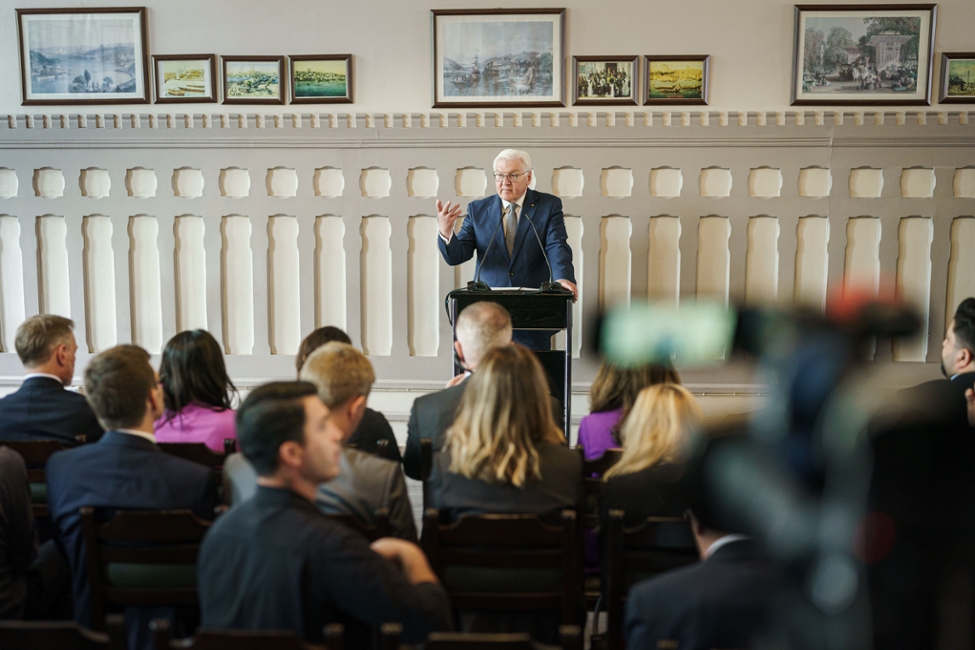I’m standing on the platform. Incomprehensible voices climb into my ears, starting to take hold. Between my shaking legs the wooden suitcase, in it worlds, worlds... What a small world it is!
This is a translation of what Dinçer Güçyeter writes in his book “Unser Deutschlandmärchen” (Our German fairy tale), describing his mother Fatma’s arrival in Germany. One can just imagine the scene, the young girl with her suitcase, probably feeling unsure and somewhat lost in a new, unfamiliar world.
Many stories like that of the young Fatma, stories of curiosity and fear, began here at this station. Hundreds of thousands of Turks set out from here in the 1960s to go to Germany as “guest workers”. A direct link from Istanbul to Munich – What a small world it is.
Sirkeci station symbolises a departure into the unknown. This journey into uncertainty initially led to homesickness, deprivation, strenuous effort. So much was new: a new language, new neighbours and colleagues, a new culture. One might say a whole new life. A life between hope and failure. Today almost three million people with Turkish roots live in our country and help to shape and form our society. They helped to build our country, they made it strong, and they belong at the heart of our society. They are represented by some of the guests accompanying me on this trip – impressive figures from the worlds of business and politics, art and literature, film and gastronomy. Several of them are familiar with Sirkeci station from their own family’s stories.
This station stands for the close connection between our two countries. Designed by German architect August Jachmund, it was the last stop of the Orient Express, which linked East and West.
Let’s not forget, however, that the history of German-Turkish migration is not one-sided. Migration took place in both directions. In the 19th century, poverty and unemployment drove craftsmen from Germany to Anatolia. The Bosphorus Germans were welcomed here with open arms. The fourth and fifth generations are now living in Turkey. And in the darkest period of our history, Turkey became a place of refuge for many German artists and intellectuals after 1933.
While, in the 1930s, Germans helped to plan and build the new capital, Ankara, from the 1960s onwards, it has been Turkish guest workers who have helped to build the fledgling Federal Republic’s economy and whose fourth generation is now playing a crucial part in ensuring our prosperity. In a month’s time, when we in Germany celebrate the 75th birthday of our Federal Republic, we will do so fully aware that the millions of stories of Turkish-German immigrants are part of our history. They are not people with a migrant background – Germany is a country with a migrant background! That is why I felt it important to visit Turkey again before the anniversary of the Basic Law. Because what we see and hear here – your stories – are a part of Turkish history, indeed a part of German history. They are a part of what makes us us today.
It is these special and intensive ties that enable us to overcome distance and sometimes differences today. In crisis situations in particular, it becomes clear just how fundamentally important they are. Following the devastating earthquake here in south-eastern Turkey, there was a huge demonstration of solidarity, especially in Germany. Germany provided the largest bilateral contribution, relief supplies and funding for humanitarian assistance. But a considerable number of private individuals were also quick to help and make donations. Tomorrow we are visiting the ravaged region of Gaziantep and meeting victims of the quake as well as relief workers. I am looking forward to the visit.
We have not been here for very long, just a few hours, but one thing I can already say is that any German coming here is welcomed with open arms. In part, but not only, this is thanks to Turkish hospitality. Above all, it is thanks to the close personal ties that can be felt throughout everyday life here. Virtually everyone here has an uncle, a cousin or a sister-in-law in Germany. Everyone has a story to tell about Almanya. I’m sure you all know the wonderful film of the same name. Just how close these ties are can be seen not least from the five million German holidaymakers a year who visit this beautiful country. And, of course, also the more than 50,000 Germans in Turkey – one of the biggest German communities worldwide, incidentally – who in turn leave their mark here.
And so it is not by chance that we are starting our journey today here at Sirkeci station. True, no tourist arrives here any more. And no train leaves here for Europe. But this station is a stone symbol of the decades-old links we share. A link from person to person.
And that is what we are going to be concentrating on now. Thank you all for coming. I am looking forward to our conversations!


